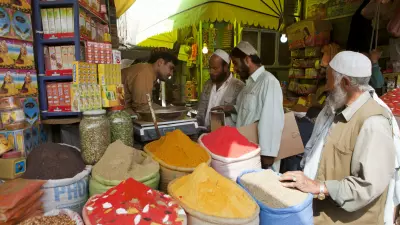When Zarpana Hussaini entered a grocery shop in Atlanta for the first time, within a few minutes, she had placed six types of fresh and dried chili peppers in her shopping bucket.

Zarpana, her husband, and their two children finished their five-months-long journey from Kabul to Atlanta in early February. She had worked as a journalist for several media outlets in Afghanistan for almost two decades.
“That day, my caseworker was laughing for a long time after she saw me rushing to find peppers, masalas, garlic, and other cooking ingredients,” Zarpana said.
Looking for ingredients in a totally different food culture, newly-arrived Afghan families are trying Asian and Arab stores in search of Halal food, their favorite spices, and masalas.
The Taliban assumed control of Afghanistan on Aug. 15, after the U.S. started the final phase of its troop withdrawal from the country, following 20 years of the war against terrorism.
More than 70,000 Afghans have been evacuated to the U.S. since August in hastily arranged efforts, amid panic and violence. They continue to settle in cities after leaving U.S. military bases — and many have come to Postindustrial regions such as Columbus, Ohio, Milwaukee, Chicago, and Pittsburgh.
Zarpana’s is one of the families that had to leave Afghanistan for safety reasons. She lived on a military base in New Jersey for nearly three months with her husband and their son and daughter.
“We would get a lot of food on the base, but its taste was not even close to what we make in Afghanistan,” she said.

In Atlanta, her goal was to get cardamom, ground black pepper, red chili pepper, cinnamon, cumin, and other spices, as well as mixed masalas imported from Asia for vegetables, biryani, chicken, mutton, and curry, she said.
“But there are other challenges — English language is a barrier, and many parents are finding it very hard to communicate,” she said.
The next big concerns are job opportunities, health insurance, and getting a driver’s license, and green cards, she said.
Nearly all of the arrivals from Afghanistan lived on military bases in the United States until their paperwork and immunizations were completed. Some of them spent about five months in Fort McCoy in Wisconsin.
“We rushed towards the kitchen like we were starving for months,” said Aziz Arab, a father of six children who recently arrived in Ohio.
“We were not actually starving at the base; we were getting enough food, but the problem was that it was boiled vegetables without salt and spices — we didn’t have our homemade food for months, with the spices that we like,” Arab said.
He said that he is finding it hard to resettle in a country that is far from Afghanistan, with a totally different culture and language.
More than 70,000 Afghans have been evacuated to the U.S. since August in hastily arranged efforts, amid panic and violence. They continue to settle in cities after leaving U.S. military bases — and many have come to Postindustrial regions such as Columbus, Ohio, Milwaukee, Chicago, and Pittsburgh.
Particularly in Pittsburgh, most of the new arrivals will start looking for the nearest Halal food market and various types of spices that are used in Afghan, Indian, and Pakistani cuisines.
“Before we came here, I called a friend in here just to ask him about Halal meat and mutton, as well as fresh and dried chili pepper, because there were no masalas used in the food on the base,” said Noorzai, a newly arrived migrant from Kandahar, the southern province of Afghanistan, who only wanted his last name to be mentioned for safety reasons.
He said that he was happy to hear about Afghan, Indian, Pakistani, Turkish, and Arab stores and restaurants in this city.
“I went to Afghan Kebab House and ordered a lot of food for take out,” he said.
The biggest challenge is housing, he said, and some landlords do want to rent out their units to the arrivals from Afghanistan because some do not have jobs or established credit.
Even as some families experience some challenges, they are free from fear of the Taliban. And several said they hope the U.S. government will create a path to bring migrants’ “nears and dears” to the states.







